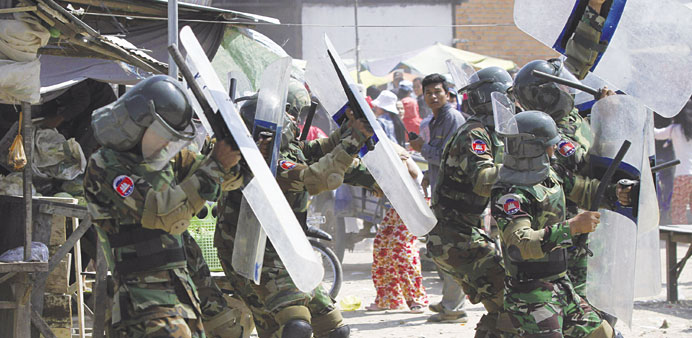Cambodian soldiers clash with workers, on the outskirts of Phnom Penh.
Reuters/Phnom Penh
Troops armed with batons and rifles broke up a protest yesterday by textile workers demanding a doubling of wages as part of a nation-wide strike by unions allied with the main opposition party.
Witnesses said around 100 soldiers wearing riot gear and carrying assault rifles used force to clear hundreds of workers protesting outside their factory about 20km west of the capital, Phnom Penh.
“Soldiers beat up everyone,” said labour rights activist Chhorn Sokha of the Community Legal Education Center. “They had sticks, electric batons, slingshots and stones.”
At least 10 protesters were detained and it was not known yet how many were hurt, she added.
Photographers, including one from Reuters, were hit by batons while covering the protest. Two witnesses said they also saw troops striking a Buddhist monk.
The clashes mark a violent turn after two weeks of relatively peaceful strikes, marches and demonstrations of unprecedented scale in Cambodia. Security forces, which have a reputation for zero-tolerance, have so far exercised restraint.
The garment workers, whose industry is a major employer worth $5bn a year to the economy, have joined protests led by the opposition Cambodia National Rescue Party (CNRP), which says it was cheated out of more than 2mn votes in an election last July.
The CNRP has courted some 350,000 garment factory workers with the promise of a minimum monthly wage equivalent to $160, a proposal dismissed by the government as unsustainable.
Their support for the CNRP represents one of the biggest challenges to the 28-year rule of authoritarian Prime Minister Hun Sen.
He has been credited with steering Cambodia away from being a war-scarred failed state to a promising frontier market, but opponents say his power comes not from the people, but from the sway he has over independent institutions and allege he rigged the election, which he denies.
The strike has blocked roads briefly in Phnom Penh and threatened to cripple an industry that is the biggest foreign currency earner for Cambodia, one of Asia’s poorest states. The government offered on December 24 to raise the minimum wage from $80 to $95, but the unions have rejected that.
Gap, Adidas, Nike and Puma are among big brands that outsource manufacturing of footwear and apparel to Cambodian factories, in part due to the cheaper labour costs than China.
Cambodian human rights campaigners denounced a crackdown on striking garment workers by a special military unit, describing it as a “disturbing new tactic” by the authorities.
The incident comes against a backdrop of growing public protests against the kingdom’s long-ruling Prime Minister Hun Sen, who was handed a new five-year term in September following disputed elections.
The use of the special military command unit to suppress the protest “is unprecedented and signals a disturbing new tactic by authorities to quash what have been largely peaceful protests”, it said.
The group said it was “gravely concerned for the safety of those still held”, voicing fears that some were severely beaten.
There was no immediate comment from the military or the government about the allegations of excessive force.
Activists said about a dozen people were believed to have been arrested including five monks, while several people were injured.
“We are peaceful protesters but they used violence against us,” said one of the strikers, Prak Sovannary.
“We will continue to strike until they (those detained) are released,” she added.
The violence occurred when a small number of people started throwing stones at the factory and at the security forces, witnesses said.
Recently striking garment workers have teamed up with anti-government protesters demanding Hun Sen step down and call a new election because of alleged vote fraud. There have been daily rallies in Phnom Penh against Hun Sen’s government, with an estimated 20,000 or more opposition supporters taking to the streets on Sunday.
Hun Sen—a 61-year-old former Khmer Rouge cadre who defected and oversaw Cambodia’s rise from the ashes of war—has ruled for 28 years, and has vowed to continue until he is 74.

